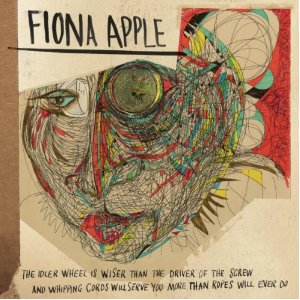Album Review: Fiona Apple ‘The Idler Wheel’
 |
Fiona Apple albums come few and far between, and each appears to have its own growing pains– though we’re judging by a small sample size; she has released just four albums in total. It seems as if the process of releasing an album is a painful and labored one for Apple, even though the act of making music is not only natural for her, but something that feels like a necessity for living.
Executives at Epic Records didn’t even know that she had been working on an album until she presented them with the finished product, after more than six years since her last work, Extraordinary Machine. The release of The Idler Wheel… was then delayed because Apple wasn’t comfortable with corporate problems within the label, and she wanted that to settle down for fear that her work would be mishandled.
‘Every Single Night’ opens the album, and it’s the first single, featuring very basic glockenspiel which invokes a childish and mysterious feeling. In contrast to that, Apple sounds frustrated and angry, which is to say that it’s business as usual. Her voice has always been great, and it’s immediately evident here that her singing has continued to mature, as she weaves through subtle vocal shifts and paints the riveting tale of creative struggle within her own mind.
The songs of The Idler Wheel… are all very stripped down, and mainly acoustic. The rhythms are often layered and clattering, brought to life with household objects or simply by drumming on a lap. All together, these things create a lot of intimacy within the music, and Apple shows tremendous maturity, like a chef able to make a great dish with only a couple of simple ingredients. The songs come to life in movements and spasms, full of character and personality, and as a result they often go to a somewhat discomforting place. The chord progression of the piano on songs like ‘Valentine’ feels just slightly off and gives an uneasy sensation. That she can milk so much emotion and atmosphere out of very basic sounds is testament to her skill.
The great jazz drumming of ‘Left Alone’ reveals more of the deceptive complexity of this album. The lyrics are very clever throughout the record, but she has particular fun with pain here. “You made your major overtures when you were a sure and orotund mutt, and I was still a dewey petal rather than a moribund slut.”
By the time you get midway through the record there should be a clear understanding that these songs are all going to sound pretty much the same, to a point, which is the album’s only real flaw. It’s alright for a record to feel quite sameish, though, if that sound is unique enough in the greater scope of music, and here it is a clear stylistic choice which works very well. Still, the weaker songs get a little bit lost with nothing to really set them apart, which is a shame because they are not unworthy by any means.
Even in The Idler Wheel’s less standout moments, Fiona Apple demands attention. This isn’t a record you can get away with playing in the background. At its most basic you could call it an angry woman messing around with a few instruments, but there is a lot beneath the surface, of both the record and the angry woman, and that becomes easier to appreciate with each listen.
‘Hot Knife’ is the last song, and probably the most unique. It has a strong feeling of building towards something, with deep and echoing drumming in the background that feels driving and menacing. Its layers of vocal harmony are a throwback to the early part of the 20th century, showcasing many different styles and the subtle ability of Apple as a singer to wear a wide range of faces. When she gets loud and lets her voice tear through the music and rise above the songs, the effect is massive, and her pained shouting on ‘Regret’ should be absolutely perfectly understood by just about any listener.
The Idler Wheel… has the sound of an incredible release from a new artist living in the alley behind a recording studio, and this may be the highest praise I’ve ever given a record. The artist in the alley happens to be a genius, and the raw tone of this record, along with the intentionally amateurish approach, is something few established artists are capable of pulling off once they become encumbered by their experience. Fiona Apple exists someplace between PJ Harvey, Regina Spektor and Tom Waits, but she’s making better music than any of them at the moment, and hers might be the best album I’ve heard all year.
Release Date: June 15, 2012
Image Courtesy of Epic Records
